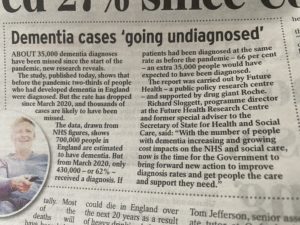Research reveals 35,000 people undiagnosed with dementia due to impact of the pandemic
35,000 people with dementia undiagnosed due to the pandemic
A new report from Future Health (FH-Dementia-Report-Hi-Res), a specialist public policy research centre, reveals the extent of the pandemic impact on dementia diagnosis rates in England. The report has been covered by the Sunday Express.

Prior to Covid-19 the Government was meeting its target of diagnosing two thirds of people with dementia receiving a diagnosis. But since 2020 this rate has dropped back to closer to 6 in 10. This fall means that thousands of people with dementia are not receiving a diagnosis and accessing the care and support they need.
The latest data show that 700,000 people in England are estimated to have dementia, but just 430,000 (62%) are receiving a diagnosis. If the Government target of two thirds was being met, an additional 35,000 people would be diagnosed.
The report, supported by Roche, also reveals a postcode lottery in dementia diagnosis rates across England. Whilst two regions London and the North West are meeting the two thirds target, the remaining five regions are not with the South West performing worst with just 57% diagnosed. The East of England also has a diagnosis rate below 60% (59.4%). If the Government two thirds target was being met, 8,300 more people in the South West and 6,700 more people in the East of England would be diagnosed.
The report also sets out the scale of the dementia challenge facing new Integrated Care Systems (ICSs). The 42 new systems became statutory leads for planning and delivering services in July last year. The research finds that:
- Only 8 of 42 ICSs (19%) are meeting the two thirds diagnosis target
- Of the six areas with the highest diagnosis rate, three are in London (South West London, 70.5%; South East London, 69%; North Central London, 68.8%)
- Of the six areas with the lowest diagnosis rates, five are in the West or South West of England (Herefordshire and Worcestershire, 51.9%; Somerset, 52.7%; Cornwall, 54.6%; Devon, 55.4%; Dorset, 55.8%)
- The ICS with the highest diagnosis rate is South West London ICS (70.5%). Herefordshire and Worcestershire ICS has the lowest rate (51.9%)
- There is a 18.6% difference between the system with the highest diagnosis rate (South West London ICS) and the lowest (Herefordshire and Worcestershire ICS)
The report calls for new Integrated Care Systems to appoint specific dementia leads, new incentives in primary care and for Government and the NHS to set out a clear plan for recovering diagnosis rates.
The report also calls for better data in calculating dementia diagnosis rates. An updated study on dementia published in the Lancet in 2020 found that around 40% of dementia cases worldwide might be attributable to 12 potentially modifiable risk factors such as diabetes, obesity, smoking and blood pressure. The report argues that applying these population health indicators to dementia diagnosis rates would provide a more accurate baseline of performance and support the more effective deployment of NHS resources.
The publication of the report follows the handing in of a petition from the Alzheimer’s Society to the Prime Minister calling on the Government to publish its delayed ten year dementia plan.
Richard Sloggett, Programme Director at the Future Health Research Centre and report author said: “The pandemic has had a devastating impact on dementia diagnosis rates with 35,000 missed diagnoses. Whilst a small number of services are meeting the two thirds target many are struggling with widespread regional variation in performance. With the number of people with dementia increasing and growing cost impacts on the NHS and social care, now is the time for the Government to bring forward new action to improve diagnosis rates and get people the care and support they need.”


